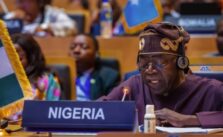Nigeria’s President Bola Tinubu has thrown his weight behind the creation of an African-led Credit Rating Agency (ACRA) to counter the bias of Western rating agencies which often undervalue African economies.
Speaking at the 38th Ordinary Session of the African Union (AU) Assembly in Addis Ababa, Ethiopia on Sunday, the Nigerian leader asserted, that “An independent African-led rating agency will provide fairer assessments and reduce the systemic bias observed in existing global rating agencies”.
With African nations grappling with rising borrowing costs, debt crises, and limited access to long-term financing, Tinubu emphasized the importance of the Africa Financing Stability Mechanism (AFSM), a financial safety net aimed at strengthening economic resilience.
His message, delivered by Minister of Foreign Affairs Ambassador Yusuf Tuggar, noted that recent decisions from the 5th Extraordinary Session of the Specialized Technical Committee on Finance held in Abuja had laid the foundation for the AFSM’s adoption, which he believes will help African nations better manage financial risks and create new economic opportunities.
Tinubu also called on the African Union Peace and Security Council (AUPSC) to establish a Combined Maritime Task Force to tackle growing threats in the Gulf of Guinea.
Offering Lagos as the headquarters for the proposed force his message underscored the urgency of maritime security amid increasing piracy and illegal activities threatening economic stability in the region.
Tinubu’s push for a joint maritime task force coincided with Nigeria signing an agreement with the African Union to provide strategic sea lift services for peacekeeping missions, humanitarian operations, and natural disaster responses.
As part of the deal, Nigeria’s Navy will provide a vessel to support AU missions, ensuring swift and coordinated responses to security threats.
Key figures at the signing included Defence Minister Badaru Abubakar, Attorney-General Prince Lateef Fagbemi, Naval Chief Vice Admiral Emmanuel Ikechukwu Ogalla, and Ambassador Bankole Adeoye, AU Commissioner for Political Affairs, Peace, and Security.
Addressing Africa’s broader security challenges, Tinubu warned that ongoing instability in Libya continues to fuel violence in the Sahel, worsening crises in Burkina Faso, Mali, Niger, Sudan, and Gabon.
“The Sahel cannot enjoy peace as long as Libya does not,” he cautioned, urging AU leaders to support stronger peace initiatives in the region.
He also welcomed the decision to upgrade Nigeria’s National Counter-Terrorism Centre into a Regional Counter-Terrorism Hub, alongside renewing the mandate of the Multinational Joint Task Force combating Boko Haram and violent extremism in the Lake Chad region.
As Nigeria positions itself as a key player in Africa’s security and economic future, Tinubu’s proposals reflect a vision of self-sufficiency, unity, and proactive leadership in tackling the continent’s most pressing challenges.
With the AU now considering these bold steps, the next few months will determine whether Africa can turn policy into action, and whether Nigeria’s leadership can help drive a stronger, more independent continent.

